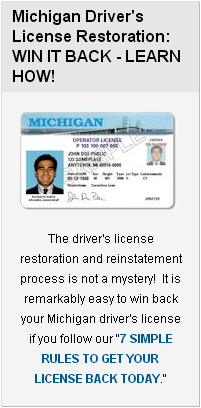Learn about the Michigan DLAD ("Drivers License Appeal Division") and Michigan
DAAD ("Drivers Assessment and Appeal Division") at the Secretary of State
Technically, it’s no longer the DLAD, but ...
The Michigan DLAD ("Drivers License Appeal Division") is no longer technically
known as the DLAD. A few years ago, this subdivision of the Michigan Secretary
of State changed its name to the Michigan DAAD ("Drivers Assessment and Appeal
Division"). Old habits die hard, however, and everyone still calls it the DLAD.
More accurately, it is the Michigan Department of State, Administrative
Hearings Section.
Hearing officers are administrative law judges
The DLAD is an administrative agency. This means that they carry quasi-judicial
powers under the Administrative Procedures Act. Under the Administrative
Procedures Act, the Legislature has delegated certain powers to an agency
acting under the authority of the Executive branch. The hearing officers are
administrative judges, and the hearings conducted at the DLAD are formal,
recorded hearings, not unlike a regular court of law. Other examples of
administrative agencies acting in quasi-judicial roles include the
Environmental Protection Agency, the National Labor Relations Board, and a
whole litany of other federal agencies. Michigan, like the federal government,
has dozens of these quasi-judicial agencies to help run the government's
day-to-day affairs.
The Hearing Officers are required to follow carefully defined responsibilities
Just like judges, the Hearing Officers at the DLAD are individual people with
different approaches and different philosophies. But unlike judges, who have
broad powers, the Hearing Officers have carefully defined and delegated
responsibilities. This means that each Hearing Officer is going to act within
those designated boundaries. Nonetheless, some tend to be a little more
liberal, while others are extremely technical and conservative. An attorney who
is experienced in driver license reinstatement issues becomes familiar with the
different hearing officers.
Because Hearing Officers act under carefully defined rules, there is nothing
stopping you from winning your license back after your first year!
The Secretary of State has promulgated specific rules based upon the statutory
mandate, and Hearing Officers most frequently deny a person’s application for
technical reasons. If a petitioner fails to provide an accurate substance
abuse evaluation, or if the person submits testimonial letters that do not meet
certain guidelines, the Hearing Officer will deny the application. But,
because Hearing Officers act under these specific rules, there is nothing
stopping you from getting your license back after your first year of
revocation, so long as you meet all the requirements and follow the technical
rules.
This is where we can help!






